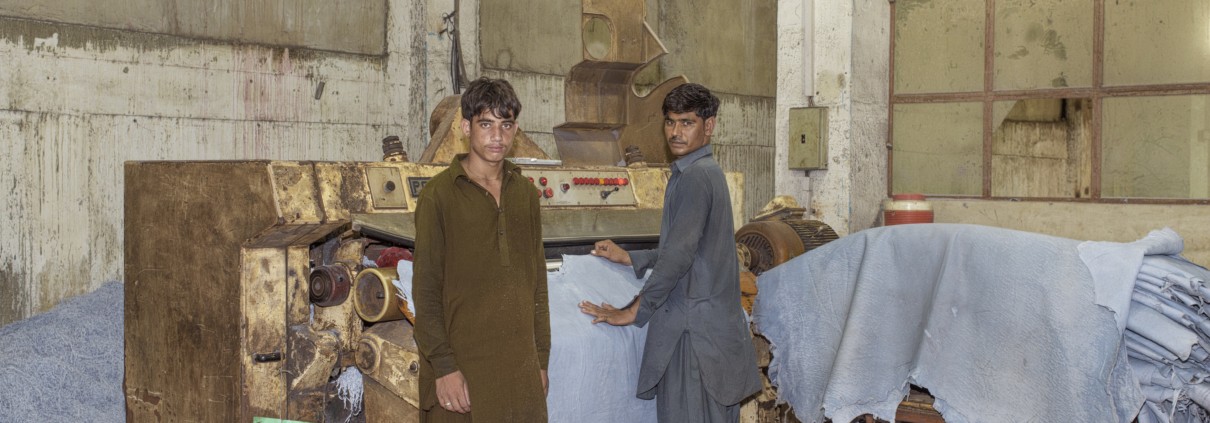The story of Imran – Bangladesh
Imran is a 40-year-old tannery worker. Originally from Rangpur division, some 300 km from Dhaka, he now lives and works in the Bangladesh capital city. He is the breadwinner for a family of five. As a shaving helper, he used to work six days a week, eight hours per day, for a meagre wage. He works at a machine that shapes the leather to the appropriate thickness for further processing. His life was never easy, but now, with the Corona pandemic, things have become even worse. Imran saw his wage decimated, and was forced to incur substantial debts. Imran and his family suffered from lack of food, and they nearly lost their house.
Imran’s factory
In the tannery where Imran works, various types and qualities of leather are produced. Most of the tannery’s output is exported to countries such as China, Japan or Italy, where it is used for all kinds of products. With 750 male and female workers, this tannery is among the bigger workplaces in the area. On this mixed work floor, the female workers sometimes face prejudices from their male colleagues. They are accused of working less hard and being lazier than the men.
The tannery is unionised. This is quite rare; most tanneries in Dhaka do not have a union on the factory level. The smaller tanneries in particular rarely have organised workforces. Generally speaking, owners are not keen on workers organising themselves.
Factory lockdown and wage loss
At the end of March 2020, the factory closed down for six weeks, due to the Corona pandemic. Workers were allowed to take paid leave for the duration of this closure, but initially no wages were paid at all. This brought Imran and his fellow workers into a situation of acute financial hardship. The Bangladesh government had decreed that employers should pay workers at least 65% of the normal wages during lockdown. Later, Imran did receive his wages for the month of April, but it was only 60% of his normal salary. For a long time, Imran remained optimistic that he would still get the remaining 5% of his April wage. This, however, never happened.
Economic hardship and struggles to survive
During the lockdown, Imran and his family got some emergency relief from the Bangladesh Labour Foundation, a national NGO. This was very welcome, but not enough to cover the family’s basic needs, and Imran had to take out a loan to survive. Even with this, they still suffered from hunger. At the end of the lockdown, the family was two months short on rent. Their landlord showed no mercy and continued to treat the family badly.
A reopened factory, but an insecure job
In early May 2020, the tannery reopened. Imran and all his fellow workers were called back to work. Luckily, no workers had been laid off when the machines started running again. But, as dismissals were constantly happening in the Dhaka leather sector, Imran felt highly insecure, every day expecting to be sacked too. When he got his next payslip in May, it turned out to be only 65% of the pre-lockdown wage. Before the Corona crisis, Imran always had the possibility to work overtime, as a way to earn more. Since May 2020, this was no longer an option due to a drawback of orders.
Unsafe working conditions
At the reopening of the factory, management set up a number of health and safety measures to prevent workers from being infected with Corona. Workers are ordered to wash their hands and do a temperature check before entering the factory. Machines in the factory are disinfected five to six times a day. Knowing how contagious the Corona virus is, Imran doesn’t feel that these measures are sufficient to keep workers safe and healthy. He is critical of his employer for not providing the necessary protective equipment, such as gloves and face masks. Also, social distancing is not implemented in the factory. Facilities to wash hands are lacking. Imran is very unhappy with the situation. He feels nervous and insecure. The union asked management to improve the Corona precautions on the floor, but to no avail. Management simply refused to answer the request.
Worries about the future
The acute hunger of the lockdown period is now over, but Imran and his family still feel the backlash of the lockdown. Imran has not yet been able to repay his debts to the landlord, a fact which continues to weigh on the family’s budget. The education of the family’s children is also at risk. One child, who was progressing well may not be able to pursue their studies because the family cannot afford it anymore. Imran knows his job is not safe, and is still very fearful of losing his job.
All in all, he remains terrified of what the future will bring for him and his family.
Corona in Bangladesh
The Corona pandemic is having a big impact on the leather sector in Bangladesh. In 2020, the major issue was the cancellation of orders by both domestic and international buyers. According to the Leather goods and Footwear Manufacturers & Exporters Association of Bangladesh (LFMEAB), as of April 2020, orders amounting to USD 316 million were cancelled. Traders were unable to get adequate prices for raw hides, resulting in a massive dumping of these materials. Highly problematic also was the interrupted supply of materials, including processed hides and chemicals. Many tanneries and factories closed. When, in March 2020, the Bangladesh authorities called for a nation-wide lockdown, more businesses had to shut their doors. In April 2021, a new lockdown was proclaimed, covering public transport and government offices, but, for the time being, excluding garment factories. Still, it is no exaggeration to say that the entire leather and leather products value chain of Bangladesh is severely disrupted.


